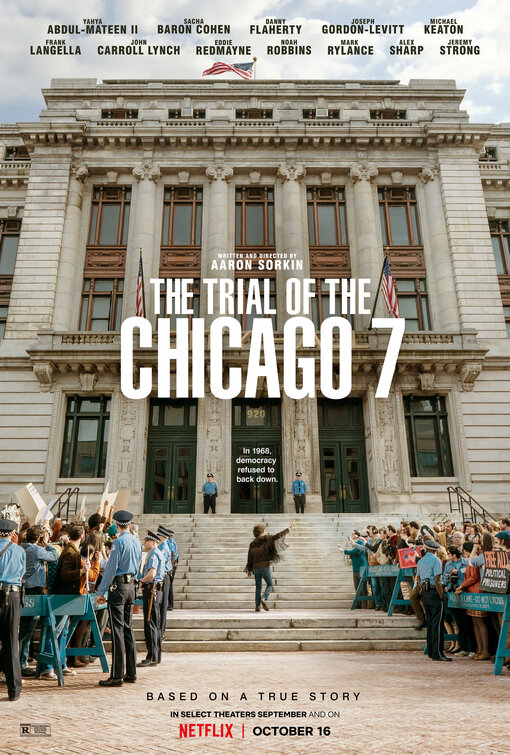
The Trial of the Chicago 7 is the most significant film of 2020. No, not really, but that’s how this solemn melodrama is presented. Incoming attorney general John Mitchell (John Doman) and his justice department have cooked up a case against a list of Richard Nixon’s enemies. To underscore the point, Mitchell even describes the litigation to prosecutor Richard Schultz (Joseph Gordon-Levitt) as “the most important trial of your lifetime.” This is a gloomy and academic courtroom drama from writer Aaron Sorkin who is a talented writer who knows a thing or two about such things. Nearly 3 decades ago he gave us A Few Good Men which is a classic I truly adore. I was primed to love this. Alas, this is my reflection on a disappointment.
Chicago 7 has value because it’s a true story. However, as the chronicle is detailed here, it wouldn’t exist solely a fictional work to be enjoyed. This is the depiction of an event from the past that seeks to instruct and enlighten. The account is based on the prosecution of a group of anti-Vietnam War protesters. They were charged with conspiracy to incite riots at the 1968 Democratic National Convention in Chicago. This timely tale “ripped from the headlines” seizes the current zeitgeist. As such, it’s been hyped as a major awards contender this year.
Aaron Sorkin is an exceptional writer. Of that, I am convinced. He won an Oscar for his screenplay for The Social Network which is brilliant. Although that picture was directed by David Fincher who imbued its aesthetic with spectacular style. This is only Sorkin’s 2nd time directing (Molly’s Game was the first) and I truly wish someone else had taken over those duties. While he has an ear for crackerjack conversation, he’s less attuned to what makes a compelling movie. He’s famous for fast-paced dialogue and extended monologues. The saga runs 130 minutes so you’re going to get a lot of those. Nevertheless, the delivery of those speeches is so traditional and dated. This feels like something you’d watch in school. There’s a frustratingly long opening montage that clumsily introduces the characters. Then there’s the actual lawsuit which is the bulk of the movie. Flashbacks are peppered into the narrative. These interstitials illustrate why these defendants are before the court. None of it is innovative or emotionally galvanizing. It simply exists to educate. This is your standard-issue Hollywood legal drama with the good guys clearly defined on one side and the bad guys on the other.
The sprawling cast is composed of unique casting choices. The “saints” include Sacha Baron Cohen as Abbie Hoffman, Eddie Redmayne as Tom Hayden, Jeremy Strong as Jerry Rubin, John Carroll Lynch as David Dellinger, and Yahya Abdul-Mateen II as Bobby Seale. They all have vignettes that will play well in the highlight reel on Oscar night — should they get nominated, that is. That clearly is the goal. Civil rights lawyer William Kunstler who defends the Chicago Seven is the designated hero so he has several moments. Actor Mark Rylance sporting long hair, is quite affecting in the role. Now for the “sinners.” If there’s a performance that’s begging for a prize, it’s Frank Langella as Judge Julius Hoffman. Initially, I was inclined to hate him as the villain of the piece. His grumpy old man character glaringly represents the establishment. However, I gradually regarded his over-the-top histrionics as a reactionary as a welcome comedic break from all the serious talk. I savored his cranky behavior in his verbal exchanges with William Kunstler.
It all climaxes with a conventional checklist of some of the most hackneyed elements ever put forth on film. The ending literally features a slow clap with the music swelling and a stirring speech. I mean it’s as cliched as anything I’ve ever seen and it’s the last thing you’re left to think about before the credits roll. Some will relish the theatrics. Overall Chicago 7 has some great writing about a historical milestone, but as entertainment it came up short for me. Be that as it may, it is just the type of didactic, politically left learning portrait that Hollywood adores. Its heart-tugging specifying is designed to win accolades. I suspect this will be recognized when nominations are announced on March 15th. It is a wee bit amusing when lesser-known defendant John Froines (Danny Flaherty) wonders aloud as to why he and Lee Weiner (Noah Robbins) have been included. “This is the Academy Awards of protests,” Lee deadpans. “It’s an honor just to be nominated.” At least the movie is self-aware.
10-16-20
